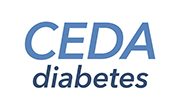On March 3-5, 2022 the 8th International Conference on Interdisciplinary Management of Diabetes Mellitus and Its Complications (INTERDIAB), which is organised by the Association for Renal, Metabolic and Nutritional Studies (ASRMN) from Romania, took place as hybrid conference with more than 650 participants. Professor Cristian Serafinceanu, president of the ASRMN and chairman of the organising committee, invited CEDA to have a symposium which was chaired by Professor Anca Pantea Stoian.
The symposium started with an introduction to CEDA from its president Professor Thomas Stulnig (Austria) who also invited participants to attend the next CEDA Congress in Vienna (June 23-25, 2022). Three scientific talks focused on different complications and comorbidities of diabetes:
In the first scientific presentation, Dr. Haifa Maalmi (Germany) presented new data on the prevalence of erectile dysfunction among novel diabetes subgroups from the German Diabetes Study. The study found the highest risk ratios for erectile dysfunction for men with recent-onset severe insulin-resistant diabetes (SIRD) and severe insulin-deficient diabetes (SIDD). These results indicate that both insulin resistance and insulin deficiency can be considered as major contributing factors to this complication, but with different mechanisms in different subgroups of diabetes.
In the second talk, Dr. Katarzyna Cyranka (Poland) discussed the link between diabetes and COVID-19, in particular the level of anxiety, stress and general mental health in people with type 1 diabetes compared with healthy controls. The study found that most patients with type 1 diabetes deal with the stressful situation of this pandemic using adequate coping mechanisms. However, there was also a group of patients who required special clinical attention and support in such a situation of prolonged stress. These data point towards the need for an optimisation of treatment and cooperation of specialists in the field of diabetes and psychology/psychiatry.
In the third presentation, Dr. Anna Körei (Hungary) addressed the question if four or five tests should be applied to assess cardiovascular autonomic function. She presented data on the diagnostic value of the handgrip test to detect cardiovascular autonomic neuropathy (CAN). The handgrip test had a low sensitivity for the presence of CAN, but a strong correlation with blood pressure. Therefore, the handgrip test does not appear suitable for cardiovascular autonomic testing.
Numerous other CEDA scientists contributed with lectures to the exciting programme of INTERDIAB 2022, including Professors Antonio Ceriello (Italy), Erifili Hatziagelaki (Greece), Christian Herder (Germany), Peter Kempler (Hungary), Nikolaos Papanas (Greece) and Thomas Stulnig (Austria). CEDA looks forward to a more intense cooperation with diabetologists in Romania and to the CEDA Congress in Bucharest in 2023 which which be organised by Professor Anca Pantea Stoian.
Prof. Dr. Christian Herder
